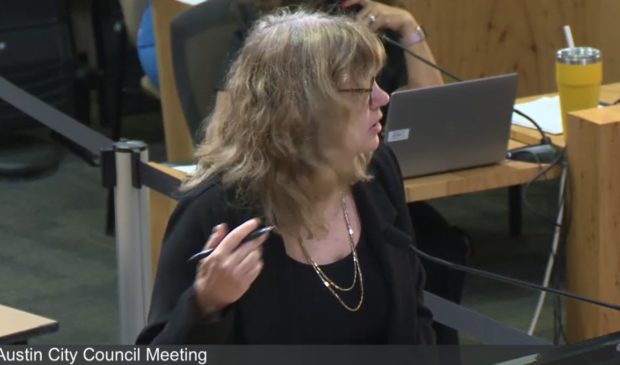Photo by ATXN. Jolene Kiolbassa speaks to City Council.
Public divided over proposed development rules
Monday, May 23, 2022 by
Jonathan Lee Members of the public weighed in Thursday on changes to Vertical Mixed-Use (VMU) zoning and the potential for relaxed development rules along busy streets as City Council continued discussions on the proposals.
Opinions were split among those who spoke at the Council meeting. Some showed support for the proposals while others opposed any changes that would allow tall buildings closer to single-family homes, and still others said Council’s proposals don’t go far enough.
Council recently has opened the possibility of reducing both minimum parking requirements and compatibility, a rule that limits building height within 540 feet of single-family homes, along major corridors. Separately, Council Member Chito Vela has proposed eliminating parking and compatibility requirements in VMU2 zoning.
Both rules constrain development, reducing the number of housing units that could be built at a time when policymakers and advocates all agree the city needs more housing. Even so, the changes are challenging politically, with some residents and Council members worried about their impact on single-family neighborhoods.
On Thursday, citizens were able to testify ahead of Council actions on June 9. Changes to Austin’s compatibility rules have long proved contentious, and some considered Council’s latest compatibility compromise weak, given the city’s housing crisis.
“We know dense housing is more sustainable and more affordable, so why would this Council choose to compromise our future just because a vocal minority does not like living near tall buildings?” said Edgar Handal, who emphasized that Austin’s rising housing costs are forcing many to leave the city. “We must stop protecting compatibility standards and parking minimums that add to the crisis.”
Others wanted to keep the rules that shield single-family neighborhoods from taller buildings nearby. Frances Acuña said removing compatibility, as well as parking requirements, “will get rid of culture and complete residential neighborhoods.” Acuña also called for more community engagement.
Jolene Kiolbassa, who sits on the Zoning and Platting Commission but spoke on her own behalf, said Council’s recent proposal to reduce compatibility restrictions on major streets just makes things more confusing. “It does come across as a little bit complicated and a top-down approach,” she said. “And so I just say, take more time so that you do have zoning and compatibility that is not too onerous.”
Speakers also differed on parking requirements. Some criticized efforts to reduce parking minimums as overlooking the needs of physical laborers. “Let’s not demonize cars and call it car storage,” Cindi Reid said. “Let’s also think about the laborer who needs their car. I live in District 4, we have lots of those. They need it for landscaping, for construction. The teacher – I used to be one – has tons of stuff.”
Those in the opposite camp say ending parking requirements doesn’t get rid of parking and is essential for the city’s climate and mobility goals. “Right now we have that one-size-fits-all – you get parking, you get parking. We’re just saying open parking options, allowing for folks to not always have to have parking if they don’t want to pay for it and they can’t afford it,” Greg Anderson said.
Many who spoke against the changes were tied to neighborhood groups, while those in favor included infill developers, urbanists and housing advocates. Public comment may not reflect broader public opinion on the issues, given barriers to attend public meetings during the work day, as some pointed out. “I work a 9-to-5 job. It is difficult to wait this long or to even have the privilege to step away to take this call and give you this response,” Cesar Acosta said. Residents also weighed in on proposed VMU changes at a virtual community meeting on May 16.
After public comment, Council members further discussed upcoming land use changes. While Council is still divided on how drastic the changes should be, there was agreement that something must be done to stem a drastic rise in housing prices.
“The point is to do something that can be done simply, and get done quickly, and that can be implemented in a way that has marginal difference,” Mayor Pro Tem Alison Alter said.
Some also showed a desire to do things instead of keep talking about them. “We’ve been studying this for 16 years,” Council Member Pio Renteria said. “This is what got us into the situation that we’re at.”
Council is set to vote June 9 on adopting changes to VMU zoning to allow more height and require more affordable units. At that same meeting, Council members may bring resolutions to reduce parking and compatibility requirements along major streets, among other potential land use changes. Council members hope to vote on adopting those proposals in September.
The Austin Monitor’s work is made possible by donations from the community. Though our reporting covers donors from time to time, we are careful to keep business and editorial efforts separate while maintaining transparency. A complete list of donors is available here, and our code of ethics is explained here.
You're a community leader
And we’re honored you look to us for serious, in-depth news. You know a strong community needs local and dedicated watchdog reporting. We’re here for you and that won’t change. Now will you take the powerful next step and support our nonprofit news organization?











